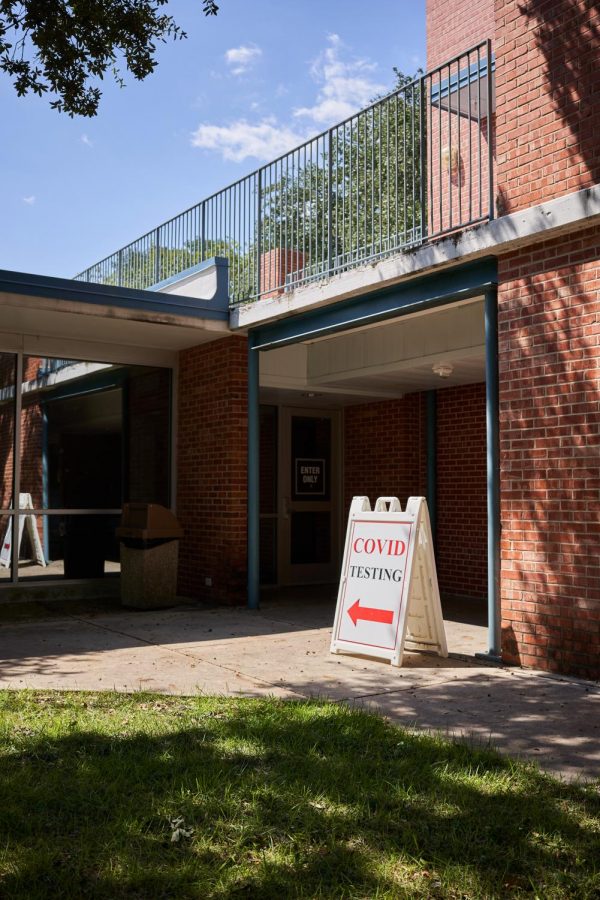Booster shots available to immunocompromised individuals
On Sept. 22, Trinity will begin offering COVID booster shots to students, faculty and staff who identify as moderately to severely immunocompromised along with a flu vaccination clinic for the general population.
The booster shot’s main purpose is true to its name, in that it acts as a supplemental vaccine when the immune response to the primary vaccine series begins to decrease over time. The CDC recommends that, though the booster will be available to all Americans on Sept. 20, people wait at least eight months after their last vaccine dose to get one. This means that those eligible for the booster upon its release will likely be health care providers, nursing home residents and other senior citizens, or in Trinity’s case, immunocompromised individuals.
“At this moment, people are not recommended to get the booster shot if they do not fall into the moderate to severe immunocompromised category,” said Marcy Youngdahl, the Director of integrated counseling and health services at Trinity.
She also asked that those getting the booster shot bring their vaccination cards to the appointment so they can verify the adequate amount of time after the last dose.
“Primarily people got their vaccines in April or May, so most of our campus wouldn’t get their booster shot until late December or January. We have a while before most people are eligible for the booster virus.”
Henry Walker-Tamboli, a junior environmental studies and mediterranean studies double-major, has Crohn’s disease. It requires him to take immunosuppressants, decreasing the effectiveness of his immune system and making him more susceptible to external infections.
“I have to be a lot more cautious. I have to be a lot more aware,” said Walker-Tamboli. “I see a lot of people walking around with their mask below their nose inside or without a mask at all, and I would never do that.”
He explained that, as an immunocompromised individual, though he has already received the booster shot, he thinks it would be a good idea to also get a third dose.
“Being immunocompromised and getting the booster is very important, and I’m really glad that Trinity is offering it,” said Walker-Tamboli. “I don’t think you could be over-vaccinated in this case.”
Additionally, campus has been seeing rapidly spreading cold and flu virus infections for the past week or so, causing a rise in COVID tests. Youngdahl explained that she believes Trinity is not seeing a huge COVID outbreak due to the high vaccination rate in the population.
“We definitely have seen more cases of upper respiratory infections that are not COVID,” Youngdahl said. “This is very normal for this time of year. During lockdown, we didn’t have cold viruses or the flu virus circulating. When everyone started going about their daily lives, viruses began to infect people quickly and in large numbers. This is what we are seeing now.”
Youngdahl said that epidemiologists predict this season to be a worse flu season than prior ones because of the lack of flu exposure in the past year.
“We don’t have as much natural immunity in our community,” Youngdahl said. “Flu mirrors COVID, so on our campus it will create problems that COVID is right now — more testing and more absences from classes.”
Trinity will be providing flu shots on Sept. 22 in Laurie Auditorium from 11 a.m. to 4 p.m. Details were released in an email on Sept. 9; participants must schedule an appointment and bring their insurance card along with a completed consent form.
“What people can do to prevent cold/flu viruses is the same thing we can do to prevent COVID: Stay home when sick, especially during a fever period, wash your hands frequently, cover your coughs and sneezes,” said Youngdahl.
It is not uncommon to see mutations in respiratory viruses like the flu and COVID. And because studies on the strains of COVID and responses from the population are ongoing, it is difficult to meet a verdict currently on whether booster doses will be recurring in our lives.
“I wouldn’t be surprised if we were to see an annual vaccine that accounts for those mutations,” Youngdahl said. “With the flu virus, a new vaccine is developed each year, taking into account different strains. The COVID vaccine may be similar to that.”
If you do not know the extent of your immunocompromisation, Youngdahl suggests you ask your physician what they recommend because not all minor cases will be accepted for the booster.
“The [primary] vaccines are still neutralizing our viruses that are circulating. Right now most of our campus is within a window where they have really good, robust immunity.”











